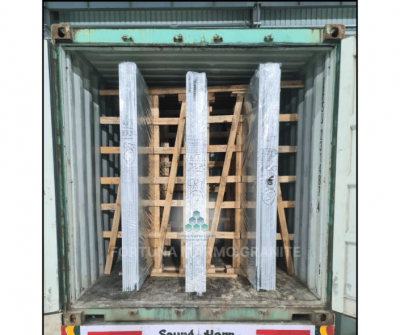What is the Maximum Number of Granite Slabs a Shipping Container Can Hold?
Granite is one of the most widely used natural stones across the globe, admired for its strength, durability, and timeless beauty. From kitchen countertops to flooring applications, granite remains a top choice for both residential and commercial projects. With the growing global demand, transportation and logistics have become crucial considerations for importers, suppliers, and manufacturers alike.
One of the most frequently asked questions in the granite export and import industry is: "How many granite slabs can a shipping container hold?" The answer varies based on several factors, including the type of granite, slab thickness, container size, and weight limitations. In this article, we'll explore these factors in detail to understand how granite slabs are loaded into containers and what influences the maximum number of slabs that can be shipped efficiently and safely.
The General Details Regarding A 20-foot Container's Storage Capacity Are Provided Below.
| Big Slabs | No. of Piece | Small Slabs | No. Of Piece |
|---|---|---|---|
| 2 cm Thickness slabs | 80 To 85 Pieces | 2 cm Thickness slabs | 200 To 250 Pieces |
| 3 cm Thickness Slabs | 50 To 55 Pieces | 3 cm Thickness Slabs | 110 To 125 Pieces |
Gross Weight Of Container 28 Tones Including Wooden Crates
The Shipping Container Sizes
Shipping containers come in a variety of sizes, but the most common types used for transporting granite are 20-foot and 40-foot containers. These are standard sizes in the shipping industry, and they are often the best option for transporting granite slabs efficiently.
20-foot container: A 20-foot shipping container typically measures 20 feet in length, 8 feet in width, and 8.5 feet in height. The capacity of this container is approximately 33 cubic meters or 1,170 cubic feet.
40-foot container: A 40-foot shipping container is double the length of a 20-foot container, measuring 40 feet in length, 8 feet in width, and 8.5 feet in height. The capacity is about 67 cubic meters or 2,350 cubic feet.
The container's internal dimensions, however, are not the only factor to consider when determining how many granite slabs can fit inside.

Granite Slab Thickness and Size
The thickness of granite slabs significantly affects how many can fit into a shipping container. The two most common thickness options are 2 cm and 3 cm, and each type influences both the weight and space utilization inside the container.
2 cm thick slabs: These are lighter and thinner, making them easier to stack efficiently. Because they occupy less space, a larger number of 2 cm slabs can be loaded into one container. Their flexibility also makes them easier to handle and transport.
3 cm thick slabs: These are heavier and bulkier, meaning fewer pieces can fit in the same container size. However, their extra thickness adds durability, making them ideal for heavy-duty applications like countertops or outdoor installations.
Additionally, granite slabs come in various formats, including gangsaw slabs, cutter slabs, and tiles. Gangsaw slabs are the largest and heaviest, occupying more space, while smaller slabs and tiles allow for denser packing within the container.
Weight Restrictions
Granite is a dense and heavy natural material, so weight plays a critical role in determining how many slabs can be safely loaded into a shipping container. Most containers have strict weight limits, and exceeding these can lead to extra shipping costs or restrictions.
Typically, a 20-foot container can hold around 24,000 to 26,000 kg (52,900 to 57,300 lbs), while a 40-foot container accommodates about 26,000 to 28,000 kg (57,300 to 61,700 lbs). These weight constraints ensure the safety and efficiency of transportation.
In the United States, a tri-axle vehicle usually has a maximum limit of 44,000 lbs (19,900 kg), which is another factor importers must consider when planning granite shipments from overseas. The combined weight of the slabs, packaging, and container must remain within these limits to comply with transport regulations.
The thickness of the granite also influences loading capacity. For instance, 2 cm slabs weigh significantly less than 3 cm slabs, allowing more pieces per shipment. On average, a 20-foot container can carry about 70–75 slabs of 2 cm thickness, while it can hold only 50–52 slabs of 3 cm thickness.
Number of Granite Slabs in a Container
To better understand how many granite slabs a shipping container can hold, let's break it down:
2 cm thick granite slabs: A 20-foot container can typically hold between 70 and 75 slabs of 2 cm thickness. A 40-foot container would hold approximately 140 to 150 slabs, depending on the weight distribution and space optimization.
3 cm thick granite slabs: A 20-foot container would hold about 50 to 52 slabs of 3 cm thickness, while a 40-foot container would hold around 100 to 104 slabs.
In both cases, the slabs are usually packed into bundles to ensure that they are well-protected during transit. A bundle typically consists of 5 to 7 slabs, depending on the thickness.
The slabs are then securely strapped together to ensure they remain stable throughout the journey. This careful packing method is essential to ensure that the granite arrives at its destination in pristine condition, ready for installation.
Loading and Packaging
Loading granite slabs into a shipping container requires careful planning and attention to detail. Granite slabs are heavy and fragile, so they must be packed securely to avoid any damage during transportation. Shipping companies and exporters use specialized wooden crates or metal frames to protect the slabs during the journey.
The slabs are often secured with strapping or padding to prevent movement and minimize the risk of breakage. These bundles are often wrapped in protective layers, such as foam padding or shrink wrap, to shield the slabs from scratches, dust, and moisture.

Conclusion
The number of granite slabs that a shipping container can hold depends on several key factors, including the thickness of the slabs, the weight restrictions, and the size of the container. Typically, a standard 20-foot container can hold between 50 to 75 slabs, with the exact number varying depending on whether the slabs are 2 cm or 3 cm thick. Proper planning and careful packing are essential to maximize container space and ensure the slabs are securely transported without damage.

